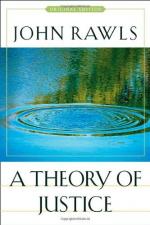
|
| Name: _________________________ | Period: ___________________ |
This test consists of 15 multiple choice questions and 5 short answer questions.
Multiple Choice Questions
1. Where did the early Intuitionists believe they got their appreciation of morals, rights and wrongs or fairness?
(a) The king.
(b) Their parents.
(c) Nature.
(d) God.
2. What does Rawls claim about the Social Contract theory?
(a) It is better than Utilitarian theory.
(b) It is better than Marxism.
(c) It is ridiculous.
(d) It is the only philosophy that makes sense.
3. Which century was Intuitionism first developed?
(a) Seventeenth.
(b) Eighteenth.
(c) Fifteenth.
(d) Sixteenth.
4. What is the maxim of Utilitarian philosophy?
(a) The greatest good to the deserving.
(b) The greatest good to the wealthiest.
(c) The greatest good for the greatest number.
(d) Might makes right.
5. Why is the argument called the Original Position?
(a) Because it comes before everything else.
(b) Because it was a very early argument that Rawls revived.
(c) Because it is about the first thing that a person sees when they wake up.
(d) Because it was the first argument Rawls thought of.
6. What is the greatest criticism levelled against Utilitarianism?
(a) That minority views are ignored.
(b) That majority views are ignored.
(c) It is not strong enough.
(d) It's not realistic.
7. What is the essential problem of Intuitionism?
(a) Many philosophers don't agree with it.
(b) Some people do not seem to act with a natural morality.
(c) It doesn't support a healthy economy.
(d) It makes defending one’s country more difficult.
8. What is the Veil of Ignorance in Rawls' argument?
(a) A metaphor to describe different types of citizens.
(b) A garment worn by politicians.
(c) A metaphor for not being able to tell what kind of society one will later be in.
(d) A metaphor for a different type of belief.
9. What branch of philosophy is this book concerned with?
(a) Metaphysics.
(b) Political.
(c) Skeptical.
(d) Epistemology.
10. What defines a good society, according to Rawls?
(a) A wealthy society.
(b) A just society.
(c) A society that owns the most land.
(d) A strong society.
11. Why does Utilitarian thinking not really understand the difference between persons?
(a) Utilitarianism is never applied to the society.
(b) It perceives persons only as voters.
(c) That different people’s situations mean different levels of happiness, contentment or suffering.
(d) Utilitarianism is never applied to the individual.
12. How does the ignorant chooser know what is fair and what is not, according to Rawls?
(a) Because the monarch told them so.
(b) Because they are taught what to believe.
(c) Because God told them so.
(d) Because of an innate knowledge of fairness.
13. What does Rawls think a person would decide about their society if they had any choice?
(a) That it be at least a beautiful land.
(b) That it would be at least fair.
(c) That it would be at least a strong society.
(d) That it be at least a wealthy society.
14. What do Intuitionist' believe in?
(a) That good and wrong are illusions told by the rich.
(b) That good and wrong are taught.
(c) That good and wrong are innately known.
(d) That good and wrong are revealed by God to the select few.
15. In what era was the theory of the Social Contract in favor?
(a) The Enlightenment.
(b) The Dark Ages.
(c) The Renaissance.
(d) The Modern Era.
Short Answer Questions
1. What does Rawls believe is the dominant theory of political philosophy throughout the 20th Century?
2. What does Rawls want his theory of justice to be?
3. In the chapter “The Original Position,” what does Rawls say must be assumed about the person?
4. Why did Hobbes see the necessity of the Social Contract?
5. What is the implicit assumption that the Social Contract theory makes?
|
This section contains 651 words (approx. 3 pages at 300 words per page) |

|




